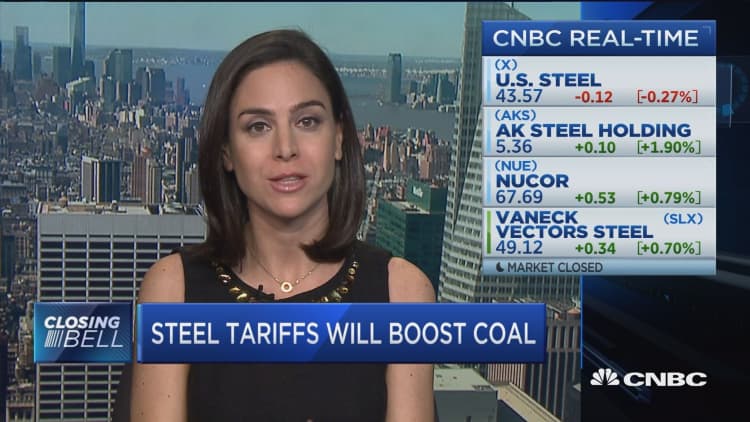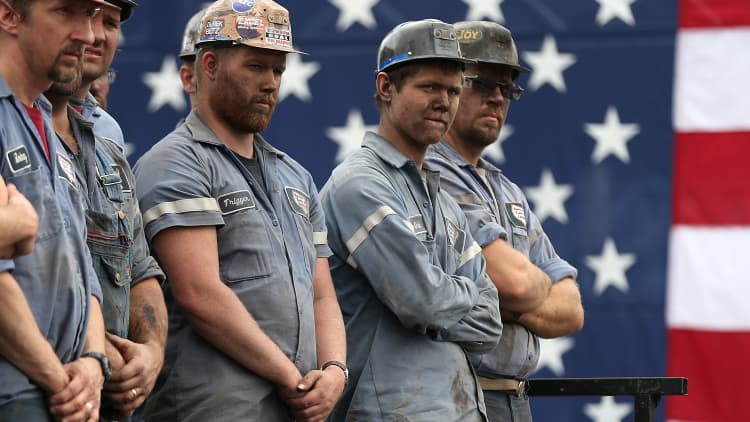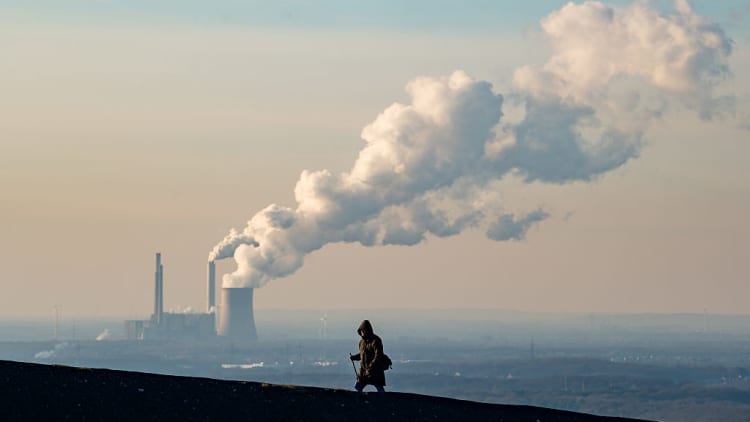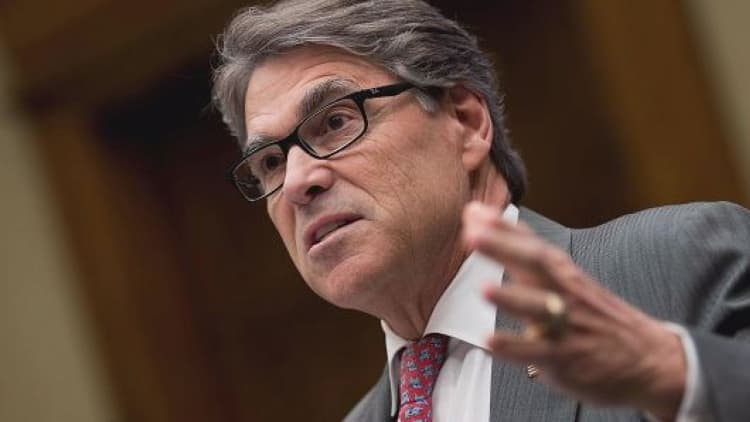President Donald Trump's order to keep failing coal and nuclear power plants open — and a proposal to use obscure executive powers to achieve that goal — has been slammed by environmentalists, energy industry groups and competitive power markets.
It turns out conservative and libertarian free market think tanks are not fans of the plan either. They are panning it as "economy-crippling central planning" and the intellectual work of someone in the "third grade."
On Friday, Trump instructed Energy Sec. Rick Perry to "prepare immediate steps to stop" the "impending retirements of fuel-secure power facilities," referring to coal and nuclear plants. The same day, Bloomberg News released a leaked draft proposal from the Energy Department. It proposed Trump cite national security concerns, allowing him to require regional markets to purchase enough power from the facilities to prevent them from closing.
If you can find anyone who's market-oriented or says they're conservative and supports this, they should turn in their badge.Peter Van DorenCato Institute senior fellow and editor of "Regulation"
The White House and Energy Department have not returned multiple inquiries regarding the authenticity of the draft proposal. On Tuesday, Mark Menezes, the Energy Department's energy policy adviser, confirmed the plan is under consideration and said the agency stands "by everything that's in the paper," the Washington Examiner reported.

In the 41-page plan, the Energy Department acknowledged that the U.S. grid operates reliably, but argued that "high-impact events caused by state actors, terrorists, or natural disasters" mean past measures of reliability may no longer be adequate.
Some conservatives who study policy suggested the Trump administration is scrambling to fulfill his campaign promise to revive the coal industry after a bipartisan regulatory board rejected an earlier bailout plan put forward by Perry. Since Trump was elected, 36 coal plants have retired and 30 have announced they will close, according to a count kept by the Sierra Club, an environmental group.
Katie Tubb, a policy analyst at the Heritage Foundation, said the administration can't find justification in past experience to subsidize the plants, so it is evoking potential future threats like cyber attacks and terrorism.

In her view, the plan stretches the limits of the Federal Power Act and the Defense Production Act to achieve a political goal. Tubb equated the proposal to President Barack Obama's use of the Clean Air Act to justify his move to limit greenhouse gas emissions from power plants under the Clean Power Plan, which conservatives often frame as an abuse of authority.
"Neither are sound, principled policy and both promise harm to consumers. Instead, the President should turn dedicated attention to reversing the underlying policies that are causing the problems he wants to fix," Tubb said.
Coal and nuclear plants are closing mostly due to competition from cheap, cleaner-burning natural gas and renewable energy.
Conservative-leaning news outlet, the "Washington Examiner" called the draft proposal a "ridiculously bad idea" that could backfire for Trump and Republicans by raising prices for households ahead of mid-term elections.
"Voters will be deciding this fall whether to deprive Trump of the ability to enact his agenda and make appointments. To the extent that he pursues economy-crippling central planning policies, he risks losing that election," the Examiner said in an editorial.
The Examiner notes that nearly all of the nation's power outages are due to problems with transmission and distribution lines that carry energy from plants to consumers, not with the facilities that generate power themselves. It says Trump's plan threatens to disrupt the industry's market-based evolution: focusing on exporting U.S. supplies to countries where coal consumption is rising.
Peter Van Doren, senior fellow at the Cato Institute and editor of the journal "Regulation," said the plan threatens to wipe out the intellectual effort that went into creating deregulated, competitive power markets in many parts of the country over the last 25 years. Those markets already put in place a system that effectively makes consumers pay for excess power capacity that can be tapped in times of high demand, he said.
Meanwhile, the nation's remaining regulated markets in the South and West already have the authority to pass on the cost of keeping the plants open to rate payers.

"This has no intellectual basis by anybody beyond the third grade," Van Doren told CNBC.
"This is like the tariffs. Find your supporters and hand out stuff and hope," he said, referring to steel and aluminum duties that Trump is imposing on U.S. allies in order to bolster domestic mills. "If you can find anyone who's market-oriented or says they're conservative and supports this, they should turn in their badge."
The Competitive Enterprise Institute declined to comment on the Department of Energy proposal until Perry officially announces a detailed plan. However, Myron Ebell, director of CEI's Center for Energy and Environment, expressed concern about the idea of intervening in free markets.
"CEI has some concerns about President Trump's directive to Secretary Perry to keep coal and nuclear plants operating that would otherwise be shut down," said Ebell, who led Trump's transition team at the Environmental Protection Agency.
One conservative group reached by CNBC, the Heartland Institute, voiced support for the plan.
"President Trump and Secretary Perry are right to focus on the national security aspect of America's energy policy after that factor was ignored by the Obama administration," said Fred Palmer, senior fellow for energy and climate policy at The Heartland Institute.
"After years of waging a war on coal, it is reassuring to see a new administration instead intent on protecting energy freedom and putting national security over green ideology," said Palmer, who served for more than a decade as senior vice president of government relations for Peabody Energy, the largest U.S. coal company when it went bankrupt in 2016.
WATCH: Regulators reject Perry's plan for coal and nuclear



